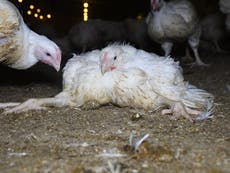Anger at government U-turn on promised ban on fur imports
Ministers accused of ‘betrayal of both animals and voters’ after refusing to change law

Your support helps us to tell the story
From reproductive rights to climate change to Big Tech, The Independent is on the ground when the story is developing. Whether it's investigating the financials of Elon Musk's pro-Trump PAC or producing our latest documentary, 'The A Word', which shines a light on the American women fighting for reproductive rights, we know how important it is to parse out the facts from the messaging.
At such a critical moment in US history, we need reporters on the ground. Your donation allows us to keep sending journalists to speak to both sides of the story.
The Independent is trusted by Americans across the entire political spectrum. And unlike many other quality news outlets, we choose not to lock Americans out of our reporting and analysis with paywalls. We believe quality journalism should be available to everyone, paid for by those who can afford it.
Your support makes all the difference.The government appears to have U-turned on a promised ban on the import of fur after months of dithering, prompting outrage from animal lovers and experts.
In a response this week to a petition calling for imports from often-torturous fur farms abroad to be outlawed, the government said it had no plans to change the law.
Humane Society International–UK, which has lobbied for years for an end to fur sales, accused ministers of betraying animals and the British public.
Fur farms have been illegal in the UK since 2003, but the country still imports large quantities of fur each year, from centres where conditions have repeatedly been shown to inflict extreme suffering.
More than £670m worth of animal skins have been brought to the UK in 20 years, official figures show.
While Boris Johnson was in No 10, a ban was promised in the Animals Abroad Bill, which the government later dropped after cabinet members Jacob Rees-Mogg, Brandon Lewis and Ben Wallace reportedly vetoed it.
In 2021, the government published a formal call for evidence on the fur trade in Britain, but has failed to release the 30,000 responses.
Various reports have suggested the ban was being dropped, but last month the Department for Environment, Food and Rural Affairs (Defra) issued a statement denying the government had performed a U-turn, blaming limited parliamentary time for the lack of progress.

It’s already illegal to import cat, dog and seal fur. Now, via a government petition, a formal response has been issued, reading: “Current government policy is to retain existing fur measures. While Defra published a formal call for evidence on the fur trade in Great Britain in 2021, we have no plans currently to make further changes.”
Claire Bass, of Humane Society International–UK, said: “Over three-quarters of the British public back a ban on imports of cruel and dangerous fur but the government simply isn’t listening.
“Instead it appears happy to remain complicit in a global trade that causes suffering to millions of animals, who are kept in factory farm conditions that are breeding grounds for disease, and could well be implicated in the next global pandemic.
“This is a betrayal of both animals and voters, and a sign of a government that underestimates how much Brits won’t take no for an answer when it comes to fighting cruelty to animals.”
Lorraine Platt, co-founder of the Conservative Animal Welfare Foundation, said the government response was very disappointing. “We want to see an end to fur farms abroad,” she said.


“I expect MPs will be talking to the government about this.”
She said with three Private Members’ Bills on animal welfare currently in Parliament, the message her group was hearing was “You’re never satisfied”.
Many shoppers buy fur unknowingly, believing it to be fake. The real thing is often cheaper than fake fur because it costs so little to rear animals en masse in cramped, dirty conditions.
Footage and testimonies from inside fur farms have shown mink, raccoon dogs and foxes suffering from infected, painful wounds and mental torture from being caged.
Labour MP Mohammad Yasin said in the Commons on Wednesday that the government had done nothing to tackle the “abhorrent” global trade.
Defra minister Trudy Harrison said the government was considering responses to the call for evidence and was still building evidence, which “will be used to inform any future action on the fur trade”.
Former chief executive of the British Fur Trade Association Mike Moser has also performed a U-turn, and now campaigns for a UK fur ban.






Join our commenting forum
Join thought-provoking conversations, follow other Independent readers and see their replies
Comments